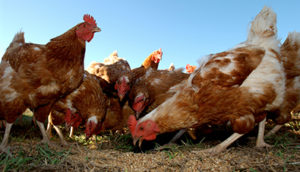Read the latest information on
Foot-and-mouth disease
 There are many upsides to keeping animals, from domestic and exotic pets through to species traditionally kept as livestock. Having animals around is great for your mental health and wellbeing, helps your household feel more connected to nature, can be part of a sustainable lifestyle, and can help to teach children about responsibility.
There are many upsides to keeping animals, from domestic and exotic pets through to species traditionally kept as livestock. Having animals around is great for your mental health and wellbeing, helps your household feel more connected to nature, can be part of a sustainable lifestyle, and can help to teach children about responsibility.
As they’re largely low-maintenance and a source of eggs, poultry such as chickens and ducks are common and popular pets, especially in rural, regional and peri-urban areas.
Just as commercial egg and chicken farms must remain vigilant about disease and pest risks, Animal Health Australia (AHA) is reminding all poultry owners to do what they can to ensure the health of their birds through some basic biosecurity measures.
“While I love the idea of keeping chickens at home, it does mean we have a large population of birds, especially around towns and cities, which are exposed to risks that most farmed birds aren’t,” said Dr Simon Humphrys, Executive Manager for Biosecurity at AHA.
“These birds can be a reservoir for diseases, like avian influenza or Newcastle disease – thankfully rare in home settings and in commercial flocks.”
For many chicken and duck owners, from households to hobby farmers, ‘biosecurity’ might not be top of mind. Put simply, it the steps you can take to ensure healthy people, animals and plants don’t get sick, and to stop conditions that affect health spreading.
For owners of small flocks, this might be nothing more strenuous than some basic hygiene practices, Dr Humphrys explains.
“Washing your hands before and after handling your birds would be an easy place to get started. You could also ask visitors to clean their shoes before entering poultry pens, especially if they have birds of their own,” he said.
“If it’s practical, you could also limit contact between your birds and wild birds, as these are the most likely to introduce a disease to your flock.”
There are several diseases which can be passed between birds and people (called zoonoses), which tend to impact young children or elderly people so limiting their exposure to sick birds could be important.
“Of course, the key thing to know is who you’ll call in the event of an animal health emergency,” Dr Humphrys said.
“Even in commercial operations with strict biosecurity practices, you can’t reduce the risk to zero. Make sure you have a relationship with a vet who can help if your birds do become sick or ring the Emergency Animal Disease Hotline – 1800 675 888.”
Find out more about biosecurity for poultry – especially if you have a larger flock – via Farm Biosecurity’s chicken, eggs and duck pages.